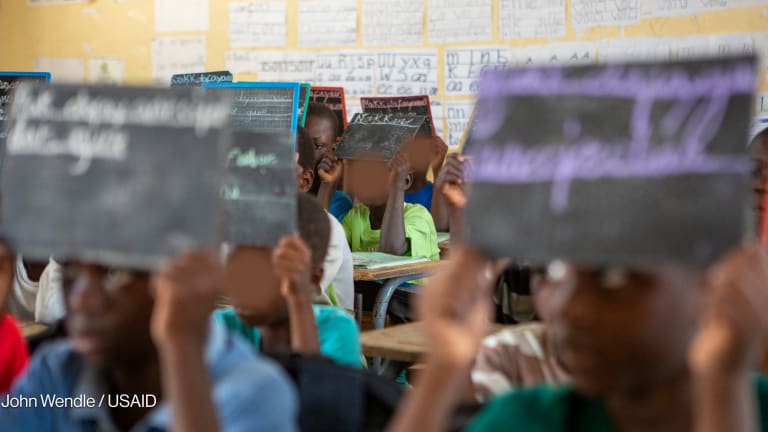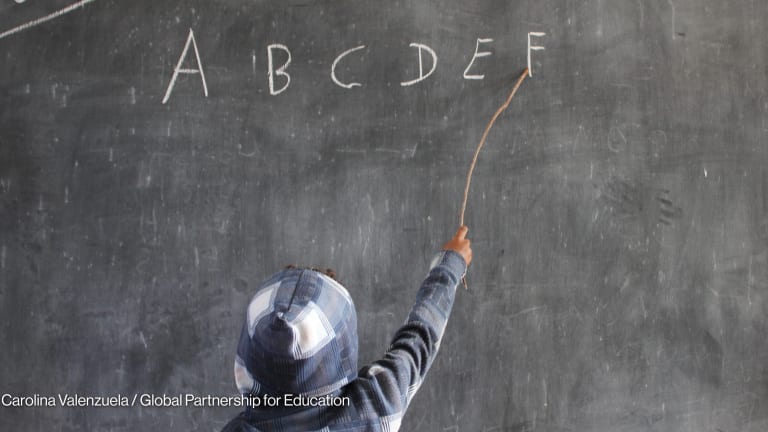
While countries around the world are racing to understand and limit the spread of the new coronavirus, and as headlines focus on those efforts, a major side effect has been overlooked: education.
More on education:
► Why education stole the show at the Global Refugee Forum
► UNESCO issues dire projections for 2030 education targets
► Opinion: The Global Refugee Forum and the case for education
As of March 16, 777 million children and students have been forced out of schools and universities in a total of 100 countries, with 85 governments closing schools nationwide and 15 others imposing localized school closures, according to UNESCO. A large majority of those – 670 million – are between preschool age and 18 years old. Those numbers are only likely to rise in the near future.
It is a staggering number, and with many other countries and municipalities likely to follow suit, there will be a profound impact on families, communities, and learning everywhere. And while interim distance and remote learning programs will be put in place in many locations, the most marginalized, poverty-stricken, and vulnerable children will be at the greatest disadvantage.
COVID-19 is, in fact, amplifying the struggles that children are already facing to receive a quality education. Even before the outbreak of the virus, there were 258 million out-of-school children across the globe — principally due to poverty, poor governance, or living in or having fled an emergency or conflict. While there are programs dedicated to ending the existing crisis in global education, the dramatic escalation that the novel coronavirus has introduced brings forward two fundamental and urgent questions.
First, how can education be continued during a global health crisis and play a role in mitigating the virus? Second, what is the role of education in preventing future pandemics?
In response to 2014’s fatal Ebola outbreak in West Africa, the Global Business Coalition for Education, an organization founded by Theirworld, put forward a threefold response for education, focusing on emergency provision, safe reopening of schools, and sustaining healthy communities — which drew on principles applicable to nearly all public health crises. All three are relevant today:
1. Ensuring emergency education provision until schools can safely reopen
If schools are closed due to a public health emergency, administrators should realize that teaching and learning do not have to grind to a halt. They can continue through programs using innovative approaches.
There are many examples of radio-, television-, cellphone-, and internet-based learning options that can be deployed. UNESCO recently published a list of platforms and programs for online learning that may be useful to schools. If distance learning is long term, careful attention should be placed on the language of instruction, content progression, and relevance for students.
Continuing to pay teachers and staff during school closures is also important. This not only allows for economic stability during the crisis, but it also avoids having them seek other employment and leave the profession.
2. Reopening safe schools
School systems should put in place a transparent plan for reopening schools as quickly and responsibly as possible. This will include preparing the physical schools for reopening, providing teachers with accurate information and training on the public health crisis, using schools as an opportunity to quickly monitor and trace any reemergence, and providing any additional physical or mental health support that students may need, especially in high-incident areas.
3. Sustaining safe schools and healthy communities
It is important to use schools as a way to implement broader public health programming. And it is equally important to develop contingency plans for future emergencies.
While we hope that children and students in the most affected areas will soon be able to go back to school and that other schools won’t be affected, let’s make sure that global
education is not forgotten during the crisis or in its aftermath. Investing in education not only provides normalcy and a pathway for our young people to participate fully in the economy and society, but it fuels innovation and the skills and talents that will be needed to combat the next pandemic or crisis.
In the coming weeks and months, many governments will have to make difficult choices about their investments in education. The crisis will stretch resources for sure. When faced with these choices, it is imperative to remember that today’s children are tomorrow’s nurses, epidemiologists, doctors, researchers, and public health experts. We need to continue investing in learning today so that the world can be better prepared to solve future epidemics and crises tomorrow.
Update, March 17, 2020: This article has been updated to reflect that 777 million children and students have been forced out of schools and universities in a total of 100 countries as of March 16.








